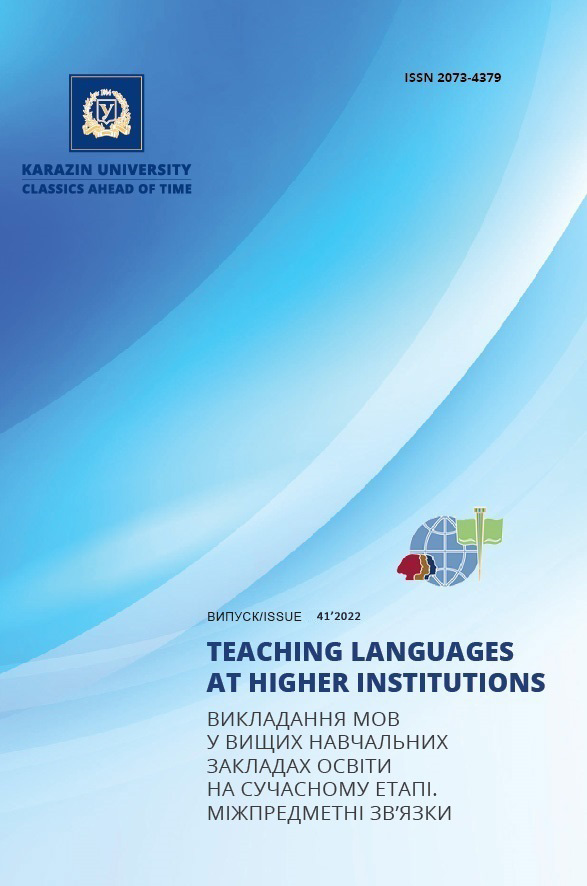Place of linguistic and country studies in the process of socio-cultural adaptation of foreign higher education applicants
Abstract
The article deals with the peculiarities of the socio-cultural adaptation of foreign higher education applicants. The relevance of the study has to do with the significant flow of educational migrants to Ukraine. Most of them experienced “culture shock” due to the discrepancy between imaginary and real life in a foreign-speaking country with a history, culture, lifestyle, and traditions different from their own. Their socialization and language training are integral components of adaptation in a foreign-language educational and socio-cultural environment, of the process of personal growth. The author describes the peculiarities of communicative and sociocultural competences formation in the process of learning Ukrainian as a foreign language and considers the advisability of using sources that reveal the evolution of the country’s history and culture in the regional dimension. Knowledge of the region or city where foreigners study helps them navigate unfamiliar places better. The paper offers a view on the role and place of linguistic and country studies competence in the process of socio-cultural adaptation. The study of local history materials by foreign students should be accompanied by visual displays of examples of material and spiritual culture. It is advisable to conduct thematic excursions (real and virtual), round tables, contests, business games, and conferences. Foreign students should be involved in various communicative situations, which would allow them to remember the vocabulary and grammar of the Ukrainian language faster and better. It has been proved that studying the history and culture of another nation using language training of foreign citizens contributes to the formation of not only communicative competence but also a versatile personality. Understanding the differences in the historical processes, cultural and socio-economic development of individual countries and peoples contributes to the formation of the foundations of humanism and tolerance. The process of adaptation to a new foreign language environment promotes awareness of one’s own identity. Prospects for further research are seen in the improvement of forms and methods of classroom and extracurricular work, the use of new country studies materials to develop and increase the level of mastery of foreign students in all types of speech activities, to promote soft adaptation to new living conditions, and personal growth.
Downloads
References
Azіmov, E.G. and Shchukin, A.N. (2009). Novyi slovar metodicheskih terminov i ponyatiy (teoria i praktika obucheniya yazykam) [A new dictionary of methodological terms and concepts (theory and practice of teaching languages)]. Moscow: IKAR, 2009 [in Russian].
Danylyuk, N. (2014). Mozhlyvosti vykorystannya linhvokrayinoznavchykh slovnykiv dlya vyvchennya inozemnykh mov [Possibilities of using linguistic-cultural dictionaries for learning foreign languages]. Aktualni pytannya inozemnoyi filologiyi [Topical issues of foreign philology], 1, pp. 68–74 [in Ukrainian].
Zadorozhnya, L. (2020). Vykorystannya lingvokrayinoznavchogo materialu na zanyattyax z ukrayinskogo folkloru. [The use of linguistic and regional studies material in classes on Ukrainian folklore]. Vykladannia mov u vyshchykh navchalnykh zakladakh osvity na suchasnomu etapi. Mizhpredmetni zviazky [Teaching languages at higher educational establishments at the present stage. Intersubject relations]. Kharkiv: V.N. Karazin Kharkiv National University, 36, pp. 56–67 [in English] DOI: https://doi.org/10.26565/2073-4379-2020-36-05.
Zankovska, G.D. (2009). Lingvokulturologiya u koli sumizhnyx lingvistychnyx nauk [Linguistics in the circle of related linguistic sciences]. Naukovi zapysky [Nacionalnogo universytetu “Ostrozka akademiya”]. Seriya Filologichna [Scientific notes [of the National University “Ostroh Academy”]. Philological series], 11, pp. 35–40 [in Ukrainian].
Zozulia, I., Stadnii, A. and Slobodianiuk, A. (2022). Audiovizualni zasoby navchannya v procesi formuvannya inshomovnoyi komunikatyvnoyi kompetentnosti [The peculiarities of formation of Ukrainian-language communicative competence of foreign students]. Vykladannia mov u vyshchykh navchalnykh zakladakh osvity na suchasnomu etapi. Mizhpredmetni zviazky [Teaching languages at higher educational establishments at the present stage. Intersubject relations]. Kharkiv: V.N. Karazin Kharkiv National University, 40, pp. 12–28 [in Ukrainian]. DOI: https://doi.org/10.26565/2073-4379-2022-40-01.
Pobydajlo, N. (2017). Formuvannya krayeznavchoyi kompetentnosti na zanyattyax iz fizychnoyi geografiyi Ukrayiny [Formation of local knowledge competence in physical geography classes of Ukraine]. Profesionalizm pedagoga: teoretchni j metodychni aspekty [Teacher professionalism: theoretical and methodical aspects], 6, pp. 159–168 [in Ukrainian].
Sylka, A.A. (2017). Dystancijnyj kurs “Ukrainian” dlya anglomovnyh studentiv: problemy realizaciyi [Distance course “Ukrainian” for English-speaking students: problems of implementation]. Yakisna movna osvita u suchasnomu globalizovanomu sviti: tendenciyi, vyklyky, perspektyvy [Quality language education in today’s globalized world: trends, challenges, prospects]. Sumy, pp. 153–158 [in Ukrainian].
Suduk, I., Lytvyn, N. and Tytova, M. (2016). Shlyahy formuvannya lingvokrayinoznavchoyi kompetenciyi na zanyattyax z ukrayinskoyi movy yak inozemnoyi [Ways of formation of linguistic and country specific competence in classes of Ukrainian as a Foreign Language]. Visnyk ONU [ONU Bulletin], Philological Series, pp. 153−159 [in Ukrainian].
Tronko, P.T. (1994). Krayeznavstvo u vidrodzhenni duxovnosti ta kultury: Dosvid. Problemy. Perspektyvy [Local studies in the revival of spirituality and culture: Experience. Problems. Prospects]. Kyiv, 1994 [in Ukrainian].
Ushakova, N.I. (2015). Lingvokognityvni zasady metodyky formuvannya inshomovnoyi lingvokulturnoyi kompetentnosti [Linguistic principles of the methodology of formation of foreign language linguistic and cultural competence]. Vykladannia mov u vyshchykh navchalnykh zakladakh osvity na suchasnomu etapi. Mizhpredmetni zviazky [Teaching languages at higher educational establishments at the present stage. Intersubject relations]. Kharkiv: V.N. Karazin Kharkiv National University, 27, pp. 117–127 [in Ukrainian].
Yashhenko, A.A. (2019). Urbanonimy yak odyn iz najvazhlyvishyx elementiv komunikaciyi [Urbanonyms as one of the most important elements of communication]. Vykladannia mov u vyshchykh navchalnykh zakladakh osvity na suchasnomu etapi. Mizhpredmetni zviazky [Teaching languages at higher educational establishments at the present stage. Intersubject relations]. Kharkiv: V.N. Karazin Kharkiv National University, 33, pp. 127–138 [in Ukrainian]. DOI: https://doi.org/10.26565/2073-4379-2018-33-11.

